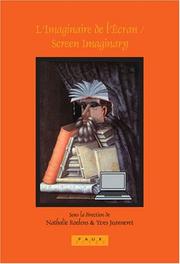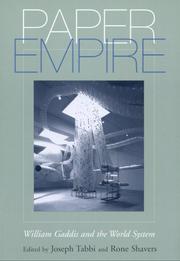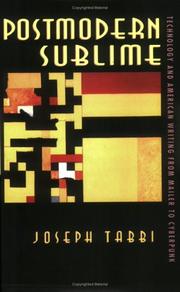| Listing 1 - 10 of 139 | << page >> |
Sort by
|
Book
ISBN: 1501347578 1501347586 Year: 2020 Publisher: London, England : Bloomsbury Academic,
Abstract | Keywords | Export | Availability | Bookmark
 Loading...
Loading...Choose an application
- Reference Manager
- EndNote
- RefWorks (Direct export to RefWorks)
"Leading creators and scholars raise provocative questions about emerging and hybrid narrative forms of digital arts and what these say about the creative imagination."--
Literature and technology. --- Literature and the Internet. --- Internet and literature --- Internet --- Industry and literature --- Technology and literature --- Technology
Book
ISBN: 1108547397 1108548490 1316477061 1107136016 131650171X Year: 2018 Publisher: Cambridge : Cambridge University Press,
Abstract | Keywords | Export | Availability | Bookmark
 Loading...
Loading...Choose an application
- Reference Manager
- EndNote
- RefWorks (Direct export to RefWorks)
Written in the shadow of the approaching millennium, American literature in the 1990s was beset by bleak announcements of the end of books, the end of postmodernism, and even the end of literature. Yet, as conservative critics marked the century's twilight hours by launching elegies for the conventional canon, American writers proved the continuing vitality of their literature by reinvigorating inherited forms, by adopting and adapting emerging technologies to narrative ends, and by finding new voices that had remained outside that canon for too long. By reading 1990s literature in a sequence of shifting contexts - from independent presses to the AIDS crisis, and from angelology to virtual reality - American Literature in Transition, 1990-2000 provides the fullest map yet of the changing shape of a rich and diverse decade's literary production. It offers new perspectives on the period's well-known landmarks, Toni Morrison, Thomas Pynchon, David Foster Wallace, but also overdue recognition to writers such as Ana Castillo, Evan Dara, Steve Erickson, and Carole Maso.
American literature --- Literature and technology. --- Literature and society --- Industry and literature --- Technology and literature --- Technology --- History and criticism. --- History
Book
ISBN: 1009192450 1009192477 1009182889 1009182870 Year: 2023 Publisher: Cambridge ; New York, NY : Cambridge University Press,
Abstract | Keywords | Export | Availability | Bookmark
 Loading...
Loading...Choose an application
- Reference Manager
- EndNote
- RefWorks (Direct export to RefWorks)
Technology in Irish Literature and Culture shows how such significant technologies-typewriters, gramophones, print, radio, television, computers-have influenced Irish literary practices and cultural production, while also examining how technology has been embraced as a theme in Irish writing. Once a largely rural and agrarian society, contemporary Ireland has embraced the communicative, performative and consumption habits of a culture utterly reliant on the digital. This text plumbs the origins of the present moment, examining the longer history of literature's interactions with the technological and exploring how the transformative capacity of modern technology has been mediated throughout a diverse national canon. Comprising essays from some of the major figures of Irish literary and cultural studies, this volume offers a wide-ranging, comprehensive account of how Irish literature and culture have interacted with technology.
Literature and technology --- English literature --- Irish authors --- History and criticism. --- Industry and literature --- Technology and literature --- Technology
Book
ISBN: 2821895062 2760635546 2760635538 2760635554 Year: 2015 Publisher: Presses de l’Université de Montréal
Abstract | Keywords | Export | Availability | Bookmark
 Loading...
Loading...Choose an application
- Reference Manager
- EndNote
- RefWorks (Direct export to RefWorks)
Dans les créations numériques, l'approche du texte est souvent conditionnée par les outils interactifs que l'on utilise, mais l'interactivité est trompeuse, car elle est à la fois voie d'accès et piège à lecteur. Pour apprécier toutes les subtilités de l'œuvre, l'internaute devra souvent déjouer les brouillages. Cet ouvrage porte sur la littérature électronique, qui n'existe que sur écran. Ses textes ne sont pas qu'interactifs, ils font parfois appel au mouvement : les mots virevoltent, des lettres se substituent les unes aux autres, le langage s'agrège à des images dans un chassé-croisé ludique. Dans cet ouvrage unique sur un art bien contemporain, Yan Rucar réfléchit sur les procédures d'écriture, sur l'hybridité avec l'image et sur l'imaginaire « machinique » qui traverse ces productions.
Littérature et technologie. --- Littérature numérique. --- Literature and technology. --- Technology in literature. --- Industry and literature --- Technology and literature --- Technology --- littérature

ISBN: 9789042019614 9789004490314 Year: 2004 Publisher: Leiden; Boston : BRILL
Abstract | Keywords | Export | Availability | Bookmark
 Loading...
Loading...Choose an application
- Reference Manager
- EndNote
- RefWorks (Direct export to RefWorks)
This book will be of interest to all those who have engaged with hypertext either as creators or as users. They will discover that screen writing has a history going back to a number of avant-garde practices which already incorporated a screen imaginary into the creative work. Readers of this volume will be offered a privileged insight into a debate between detractors and advocates of the new modes of writing and reading and the new means of cultural transmission (CD-ROM, the Internet, digitisation); they will thus be able to weigh up for themselves the assets and illusions, the heuristic merits and politico-commercial issues at stake. May these reflections convert the globe-trotters of hyperspace into knowledgeable navigators! Cet ouvrage intéressera quiconque est confronté à l'hypertexte, que ce soit en tant que concepteur ou en tant qu'usager. Il découvrira ici que l'écrit d'écran a une histoire qui remonte à certaines pratiques avant-gardistes qui avaient déjà intégré un imaginaire de l'écran dans leurs créations. Il entrera de plain-pied dans un débat entre détracteurs et partisans des nouvelles modalités d'écriture/lecture et des nouveaux supports de transmission culturelle (cd-rom, Internet, digitalisation), afin qu'il puisse lui-même faire la part entre les atouts et les leurres, entre les mérites heuristiques et les enjeux politico-mercantiles. Que ces réflexions puissent convertir les globe-trotters de l'hypersphère en navigateurs avertis!.
Digital literature --- Hypertext systems --- Literature and technology --- Literature and the Internet --- History and criticism --- Internet and literature --- Internet --- Industry and literature --- Technology and literature --- Technology --- Hypertext --- Interactive multimedia

ISBN: 081738152X 9780817381523 0817315489 9780817315481 0817354069 9780817354060 Year: 2007 Publisher: Tuscaloosa University of Alabama Press
Abstract | Keywords | Export | Availability | Bookmark
 Loading...
Loading...Choose an application
- Reference Manager
- EndNote
- RefWorks (Direct export to RefWorks)
Celebrates and illuminates the legacy of one of America's most innovative and consequential 20th century novelists. In 2002, following the posthumous publication of William Gaddis's collected nonfiction and his final novel and Jonathan Franzen's lengthy attack on him in The New Yorker, a number of partisan articles appeared in support of Gaddis's legacy. In a review in The London Review of Books, critic Hal Foster suggested a reason for disparate responses to Gaddis's reputation: Gaddis's unique hybridity, his ability to "write in the gap between two dispensations,-betwe

ISBN: 1501717642 9781501717642 0801430747 9780801430749 0801483832 9780801483837 Year: 2018 Publisher: Ithaca, NY
Abstract | Keywords | Export | Availability | Bookmark
 Loading...
Loading...Choose an application
- Reference Manager
- EndNote
- RefWorks (Direct export to RefWorks)
Focusing on works by Norman Mailer, Thomas Pynchon, Joseph McElroy, and Don DeLillo, Joseph Tabbi finds that a simultaneous attraction to and repulsion from technology has produced a powerful new mode of modern writing-the technological sublime.
Technology in literature. --- Sublime, The, in literature. --- Postmodernism (Literature) --- Literature and technology --- American literature --- Industry and literature --- Technology and literature --- Technology --- History --- History and criticism.
Book
ISBN: 160938346X 9781609383466 1609383451 9781609383459 Year: 2015 Publisher: Iowa City
Abstract | Keywords | Export | Availability | Bookmark
 Loading...
Loading...Choose an application
- Reference Manager
- EndNote
- RefWorks (Direct export to RefWorks)
"A collaborative critical analysis of a work of digital literature, this book models how scholars can and need to weave together multiple methodologies from the digital humanities in order to effectively analyze born-digital electronic literature"--
Book
ISBN: 0814271383 0814212514 Year: 2014 Publisher: Columbus : The Ohio State University Press,
Abstract | Keywords | Export | Availability | Bookmark
 Loading...
Loading...Choose an application
- Reference Manager
- EndNote
- RefWorks (Direct export to RefWorks)
Book
ISBN: 0472121871 0472073109 0472053108 Year: 2016 Publisher: Ann Arbor, Michigan : University of Michigan Press,
Abstract | Keywords | Export | Availability | Bookmark
 Loading...
Loading...Choose an application
- Reference Manager
- EndNote
- RefWorks (Direct export to RefWorks)
Science fiction, Argentine --- Literature and technology --- Fantasy fiction, Argentine --- Spanish Literature --- Romance Literatures --- Languages & Literatures --- History and criticism --- Argentine fantasy fiction --- Fantastic fiction, Argentine --- Industry and literature --- Technology and literature --- Argentine science fiction --- History and criticism. --- Argentine fiction --- Technology
| Listing 1 - 10 of 139 | << page >> |
Sort by
|

 Search
Search Feedback
Feedback About UniCat
About UniCat  Help
Help News
News